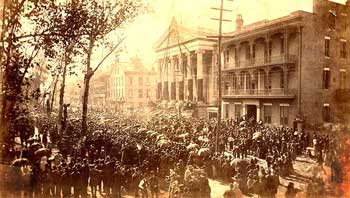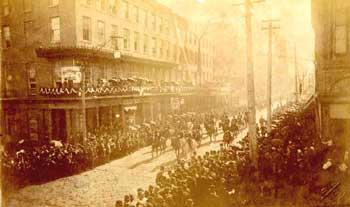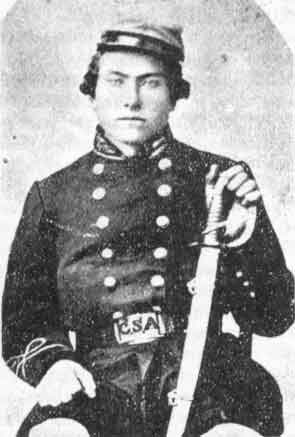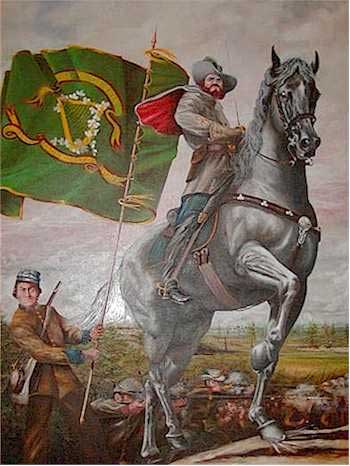Patrick Griffin: In His Own Words
Part One
By
J. R. Reddig
J. R. Reddig, great-great nephew of Patrick Griffin. Tenth Tennessee (Irish) Brigade who fought in the Battle of Raymond. Genealogical information was compiled by Barbara Foley Nakaska in 1963. She was Patrick Griffin's great-niece, and heard the stories first hand.
The document is the transcript of a speech that Patrick [Griffin] made in 1905, to a meeting of Frank Cheatham Camp of the Confederate Veterans of America, at Nashville, Tennessee.
It had been almost forty years since the conclusion of the Civil War, or whatever you might wish to call it from the distance where we sit these days. There was great interest in the conflict as it was being re-made to suit the needs of the present, even as it has been again in our times. The Great War of our Fathers is being re-interpreted in our times, both by those who honor the last of those who served who are still with us, and by others who have other agendas. That is the nature of our common narrative, and our changing opinion about our past.
Patrick's tale is part history, part tale of high adventure, colored in sepia tones of memory, and embellished with details that almost certainly never happened. It does not deal with the issues which we hold central to the terrible conflict today. It would not have occurred to the seventeen-year-old Irish immigrant to even think them, then.
Coincidence is part of the tale. I come from the Unionist line of Irish, though their voices have left nothing behind. Patrick's are the only words that remain, clear and direct across the years. My kin from Ohio were on the same field at the Siege of Vicksburg, and another cousin on the gunboats on the river below. They have no voice, and Patrick, it must be said, took full advantage of being the last man standing.
At least part of it is the gospel truth, there is no denying that. The origin of the speech was a chance encounter between S. A. Cunningham, editor of the Confederate Veteran, a prominent gazette of the day, and Patrick . They were together on the train ride down to the funeral of President Jefferson Davis in New Orleans. It was December of 1899, and by chance, Cunningham, who was a veteran of the 41st Tennessee Infantry, struck up a conversation with Patrick. It soon became evident that they had been on the same field at the Battle of Raymond, and actually crossed paths there in the rout. Cunningham encouraged Patrick to write up his recollections for presentation to his veteran's group.
|
||||
Along the way, the paper was printed in the Nashville American, so I sense the hand of a reporter in the preparation of the speech. Still, it is unusual for a common citizen to hear the words of a family member a century after the fact, and imagine in them the stories that have been lost in the passing of the generations since.
Imagine, if you will, that a distinguished gentleman with a goatee and heavy moustache, clad in a gray frock-coat, rising to the podium in a hall redolent of the smell of cigars. Ceiling fans rotate slowly. Introductions are made, and a man begins to speak. There is a twinkle in his eye and a touch of Ireland in his voice.
|
Patrick Griffin, in His Own Words, in the Spring of 1905 Patrick Griffin, 1905,
speech to a meeting of Frank Cheatham Camp
Mr. President, Ladies and Comrades. It is hardly fair to ask a fellow to relate a reminiscence in which he takes such a prominent part. When I told the story about Raymond to my friend, S. A. Cunningham, editor of the Confederate Veteran, and a member of the 41st Tennessee Regiment, who was at Raymond, Mississippi, on May 12. 1863. He said the matter was worthy of record. I appreciate the opportunity to tell you something about my old regiment, the Bloody Tinth, Tennessee Infantry, Irish, and to give you a few glimpses of a clean, strong, brave man, a noble soldier, a loyal friend, Col. Randall W. McGavock. What a multiplicity of things the sound of that name brings to mind! Across the years I hear the tread of marching armies and the notes of the fife and drum. Once again Capt. McGavock ranges his company in Cheatham's store on College Street. The command is given for the Sons of Erin to march, and I find myself walking with old Jimmy Morrissey and making an earnest effort to drown the sound of his fife in the glorious strains of The Girl I Left Behind Me. Jimmy Morrissey had been a fifer in the English army, so this going to war was nothing new to him; but I was the proudest boy in the world without a doubt, for, notwithstanding the fact that my mother had repeatedly declared that I was under age and had on one occasion taken me out of the ranks and led me home by the ear, the conceit would not down that the war could not be carried on unless I were there to make the music, and so on that never-to-be-forgotten day when we marched down to the wharf and boarded the steamboat B. M. Runyon I would not have been willing to exchange places with Gen. Lee.
On the day we embarked, Capt. McGavock came up to the standard of my ideal, and I styled him God's own gentleman.' While it was only a boy's thought, I never have found a more appropriate title for him. I might spend the night idling you of innumerable noble deeds that could be traceable back to him. My mother was there in the crowd on the wharf with several of my relatives, and a slip of a girl with blue-gray Irish eyes and auburn hair stood out from amongst them to wave her hand to me. I can almost see the sunlight on the water and the two big fellows who jumped overboard Martin Gibbons and Tom Feeny. They could not stand the pressure; but they were picked up, and as the boat started up the river to make the turn Jimmy Morrissey and I started up the same old tune of The Girl I Left Behind Me, and we kept it going till the hills around Nashville had vanished from sight. At Clarksville, we started in on it again, and another member of the company jumped overboard. Then the captain advised us to give them something else, so after our comrade was rescued we gave them old "Garry Owen" all the way down to Dover. At Dover we helped to build Fort Donelson. Later, after the Sons of Erin became Company H, 10th Tennessee Infantry, we went down on the Tennessee River and built Fort Henry. At Fort Henry there was no whisky on our side of the river, but across the stretch of water was Madame Peggy's saloon. There was some mystery as to where the beverage she sold was obtained, but this only added to her popularity. Many an amusing incident had its root branch in Peggy's shop. One of these, treasured in the memoirs of Capt. Tom Gibson's company, I will relate: One night Paddy Sullivan and Timothy Tansey went over to Lady Peggy's to get some whisky; and when they returned to the river bank a small cloud appeared upon the horizon. They paid no attention to this, however, but rowed out into the middle of the wide Tennessee River. A squall suddenly overtook Paddy and Timothy. The waves got so high that the brave ladies thought their time had come. Timothy said to Paddy: "Bejabbers, Paddy, and the boat will lie overturned and we will lose our whisky." Says Paddy to Timothy: "Be sure and we won't; we will just drink it and save it." And drink it they did. The refreshment added to their courage and strength, and they reached the shore, but the boys in camp were minus their jiggers. Peggy did a land office business until Col. Heiman ordered all the skiffs and small boats in the neighborhood smashed. I never visited her shop until after the destruction of the boats. All my life I had had a close acquaintance with water, so the old river held no terrors for me, and only a short interval elapsed before I was commissioned courier and general canteen bearer between Peggy's and the fort. The hours were brimming over with fun. Most every night we had a stag dance, and there was an exchange of visits right and left, and no time to think of the dark days ahead. We had not been at Fort Henry very long when we got our full quota of Irish companies to make a regiment, and Capt. McGavock became-lieutenant colonel of that regiment-the 10th Tennessee Infantry, Irish. In the new companies that came in, several better drummers than I was were found, so I had to hand over my instrument; and to console me for the toss they made me orderly sergeant of me Sons of Erin, now Company H. At Fort Henry we got our first taste of bombshells, and we went back to Fort Donelson to make the acquaintance of Minie balls. It was at this period that the regiment won its sobriquet of Bloody Tinth. It happened in this way: At the evacuation of Fort Henry it was rumored that the Yankees were trying to head us off, but for some reason the Tinth failed to get this news. The Yankees were pressing us closely, and the two regiments in the lead threw down their guns in order to get to Fort Donelson at a double-quick, and the Tinth, bringing up the rear, picked up the cast-off guns, so we had about seven shots apiece when the Yanks charged us. It is a sure-enough Irishman who will have first blood in a fight With all their fighting ability, the Tinth was surrendered at Fort Donelson without their knowledge or consent, and for the first time since we left Nashville, Lieut. Col. McGavock and I were parted. He was sent to Camp Chase, and I with Company H to Camp Douglas. Most of you are conversant with the routine of prison life. I will not go into detail regarding it Suffice it to say that I served with distinction as orderly sergeant of Company H, having been sent to the "Black Hole" oftener than any other orderly sergeant for overdrawing rations and clothes. Doubt- less I would have gotten into very serious trouble during the first few months of our imprisonment were it not that Col. Mulligan, the commander of the post, was an Irishman, and, hearing that my name was Pat, he took me for an Irishman, too; and, although he was a Yankee, he had a heart. Some of oar fellows were in bad shape there, and they certainly needed all that I could get for them. All of the prisoners regretted the removal of Col. Mulligan; and well they might, for it was a "son of a gun" that came after him Col. Tucker. It makes me mad now to dunk about him. We had to fortify our bunks, and did not dare to poke our heads outside of the barracks after night- fall unless we were willing to have bullets pitched our way. We were offered every inducement to take the oath or join the Yankee army. But after meeting Col. Tucker, I knew that it would be impossible for me to ever become a Yankee.
Very few of the boys went over to die other side. I think those of us who were there found the latter portion of that seven months about the worst part of our existence. It is needless to say that the news of exchange was a matter for general rejoicing; and when Col. Tucker and Chicago faded from sight we felt as if we had gotten out of the devil's clutches. At Cairo, our officers were waiting for us. Most of them were looking the worse for wear, but Oh, how good it was to know that those of us who were faithful were together again! From Cairo we went by boat to the island above Vicksburg, where Grant was trying to change the course of the Mississippi and from this island we were ferried over to Vicksburg. After landing, we marched to a field outside of die city, where the ladies had prepared a grand barbecue for us. It is hardly necessary for me to tell you how we boys did justice to aII the good things. Next we went into camp at Clinton, where we were sworn in for three years, or the duration of the war. We elected our officers and made preparations to go on the warpath once more. Lieut Col. McGavock became our colonel, Sam Thompson, lieutenant colonel, William Grace, Major, Theodore Kelsey, adjutant. We spent the ensuing few months hunting Yanks in the country around Vicksburg, until we were ordered via Holly Springs, Miss, to reinforce Price and Vandorn, who were moving on Corinth. We did not get there in time, but we joined the retreating army near that place and went on one of the severest marches of the War. It rained in torrents' and the mud and water were awful. On this march many of our men, fresh from prison, were stricken with sickness. Just before we reached Grenada one evening, being sick and worn out from exposure, Capt. Thomas Gibson concluded that he would leave camp and go into an abandoned Negro cabin near by for shelter. After Gibson had got a good fire going, in came Lieut. Lynch Donnahue, of the regiment, wet and sick also. After drying their clothing and shoes a bit, they went to sleep. Gibson made a pillow of his shoes and advised Donnahue to do likewise; but the Lieutenant had more confidence in mankind and left his shoes near the fire to dry. While the two officers were sound asleep, some soldiers came into the cabin and took Lieut. Donnahue's shoes. Imagine the cuss words when Donnahue found his shoes gone, and he sick and the rain teeming down! Gibson was a good forager, however, and he soon hailed a servant of Gen. Price's who was passing by the cabin, and he persuaded the Negro with some cash to procure a pair of shoes for his guest. At Grenada we received orders to go to Jackson. We boarded the cars and were sent on to Vicksburg, as it was rumored that the Yankees were about to storm the city. We got into Vicksburg at night, and were ordered up on Snyder's Bluff. I do not believe any man who was there will ever forget that night, even if he were to live a thousand years. Such thunder, rain and lightning I never saw and heard, before or since. We were ordered not to make a sound, not even so much as a whisper. We could only take a step when the lightning flashed, and then we moved from one tree to another, clinging to the branches to keep from slipping over the bluff. Up at the mouth of the Yazoo we could catch a glimpse of the Yankee gunboat lights. For the next several nights we were sent down on the levee. The march and long wait were made in absolute silence. The enemy must have suspected that the Tinth was waiting to give them a warm reception, for they failed to show up. At intervals Long Tom would throw a ball from the top of Snyder's Bluff up the river to entertain the gunboats. From Vicksburg we went on a transport to Port Hudson. Queer things happened on that transport. When we reached Port Hudson, the boat was minus all of its mirrors, knives forks, spoons, blankets, and rations. The captain of the transport reported the matter to Col. McGavock, who ordered his men to fall into line, spread their knapsacks on the ground and open them out, and also to turn their pockets inside out. Col. McGavock, the officers of the regiment, and the captain of the boat went from one end of the line to the other but not one thing could they find that belonged to the boat. After the search was completed, Col. McGavock made a speech to the captain of the transport, in which he eulogized his regiment, saying that it was made up of honest and brave men, and that as a matter of course, it must have been some other soldiers or thieves that had ransacked the boat. However, Col. McGavock went to the commissary and drew enough rations to supply the captain and his crew until they got back to Vicksburg. We helped to fortify Port Hudson, and we were there at the bombardment. On the night of the bombardment we had a pyramid of pine-knots built up about a mile below the port, right opposite where the gunboats were anchored. We had orders to set fire to the pine knots when the first boat advanced. Two forty-five-gun frigates started up the river at nightfall. The pine knots were ablaze instantly, and every movement of the fleet was seen by the gunners at the port. The first frigate succeeded in getting past, but she was battered up considerably. The second frigate made an effort to compel the port to surrender, but we poured shot into her at such a rapid rate that she ran out the white flag. We ceased firing at once; and when her commander saw that we had stopped, they began firing on us again. Then the captain commanding the battery ordered the boys to "give 'em red-hot shot." The order was obeyed, and the red-hot shot set fire to the frigate, her machinery stopped, and she began to swing round and round. The crew jumped overboard, and we could hear the cries and groans of the wounded and dying. Admiral Dewey was on that frigate. He was not an admiral then, but be must have been a good swimmer. Directly the fire reached their ammunition, when bombshells and cartridges began to explode in a grand fusillade. She floated down the river, and the boats of the fleet moved hurriedly in order to give her plenty of room to pass. Several miles below the magazine exploded, and we knew that the end had come for that frigate. It was a wonderful sight. The port lay in the shadow, and below it the Mississippi stretched away a veritable stream of fire. Farmers who lived ten miles away told me afterwards that the light was so bright at their places on that night that they could pick up pins in the road. After this disaster, the Yankees decided that it would be best to make an entrance by the back way. At Port Hudson Col. McGavock gave me a good round scolding for exposing myself in range of the enemy's guns and being wantonly reckless. I think he must have had some premonition of his death, for he told me that he was afraid that he would never get hack home. From Port Hudson we went to Jackson and then to Raymond. We camped outside of Raymond on the night of May 11, 1863, and the next morning we marched through the town. The ladies who lived there came to meet us with baskets of pies, cakes, and good things. They were even kind enough to bring buckets of water and dippers, and many a soldier blessed them as they passed down die ranks. A hushed stillness seemed to hover over die world that morning. A mile or so from town we sighted die enemy. We had marched up on a rise and were out in the open, and they were in the woods about one hundred yards in our front when they began to fire on us. I was standing about two paces in the rear of the line and Col. McGavock was standing about four paces in my rear. We had been under fire about twenty minutes, when I heard a ball strike something behind me. I have a dim remembrance of calling to God. It was my colonel. He was about to fall. I caught him and eased him down with his head in the shadow of a little bush. I knew he was going, and asked him if he had any message for his mother. His answer was: "Griffin, take care of me! Griffin, take care of me!" I put my canteen to his lips, but he was not conscious. He was shot through the left breast, and did not live more than five minutes.
When I saw that he was dead, I placed his head well in the shade and stepped back into position. The field officers being at the ends of the line, I had no opportunity to report to them that he had been killed. The orders came in quick succession, "Left flank by file left!" "Double-quick, march!" and then "By the right flank!," and the next command was drowned out by the Rebel Yell. We 'charged the Yankees and chased them into the woods. At the edge of the woods the order was given to "Double-quick" and we were halted again under die protection of a little hill. On the top of this hill there was an old log cabin, and twenty of our fellows went into it to fire through the chinks in the wall at the enemy. Not one of these men was ever seen alive again. We had to stand and see them shot down like rats in a hole. Every time one of them attempted to get away a bluecoat in the woods brought him down. I remember one member of my company, John Corbett, called to me to come and get his money for his wife. He said that he was wounded and dying. Any man who attempted to climb that hill must die also. Lord, we learned what war meant that day. While we were halted there I met Lieut. Col. Grace and asked him if he knew that Col. McGavock had been killed when the battle first began. "My God!" he exclaimed, as though he hardly believed it. I assured him that it was true. He then told me that the order was to get out of there the best way we could. I explained to him that I wanted to go back after the Colonel's body, but he said that it was out of the question. I insisted that I had given my promise to the Colonel to take care of him, and that I was going to do it to the best of my ability, whatever happened. He replied that if I went it would be at my own risk. I got two of the members of my company to volunteer to go with me. We found the body just where I had left it. We picked him up tenderly and started toward town. I hope and trust that God will never let me find a road so long and sorrowful again. Capt. George Diggons and Capt. James Kirkman were the only members among the wounded of my regiment who were able to get away from the battlefield. The Confederates were retreating rapidly, and we were not far on the way when the Yanks came in sight. As soon as my two comrades saw them, they let loose of the Colonel's body and started to run, but I drew my pistol and told them they would have to die by him; but later, seeing there was no possible chance of escape, I told them they could go and I would stay with him. The Yanks came rushing along, some of them stopping long enough to make some jeering, sarcastic remark, but they could not shove the iron any farther into my heart that day. It was fully two hours before the rear guard came up. The officer in charge was an Irishman, and I want to say right here that I am convinced that if ever there was a good Yankee he must have been Irish. Capt McGuire I heard the fellows call him, and I learned that he- came from die same county in Ireland, my parents came from. He asked me who was this officer I was holding in my arms; and when I told him that it was my own colonel, McGavock- an Irish name-he took it for granted that the Colonel was a "townie" of mine, and he ordered his men to place the body in one of the army wagons. The Colonel was free for evermore, and I was the lonesomest, saddest of prisoners.
<click here for
Part Two, "Burying Col. McGavock, Finding A Tobacco Stash & The Great Escape"> |
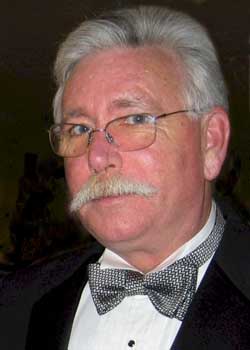 J.R.
Reddig is the great great grandson of Barbara Griffin, whose brother
Patrick Griffin fought for the 10th Tennessee (Irish) Infantry at the
battle of Raymond. She married a Union soldier of the 72nd Ohio
Volunteer Infantry.
J.R.
Reddig is the great great grandson of Barbara Griffin, whose brother
Patrick Griffin fought for the 10th Tennessee (Irish) Infantry at the
battle of Raymond. She married a Union soldier of the 72nd Ohio
Volunteer Infantry.
Reddig was a career naval intelligence officer, retiring with 27 years of service in ships and jet squadrons, and the usual assortment of three-letter Agencies ashore. He was one of the first to arrive off the coast of Iran in 1979, responding with USS MIdway at the beginning of the Hostage Crisis. Professionally, he has been dealing with consequences ever since.
In retirement he is a government contractor and occasional correspondent for the BBC, residing in Arlington, Virginia, precisely half-way between the famous Arlington Line of Civil War defenses erected shortly after the Union Army occupied the County, and from Arlington House, the former Custis-Lee home of General Robert E. Lee. He expects to be buried at the cemetery that surrounds the mansion, eventually, though he is in no hurry to do so.
Reddig writes,
Daily Socotra, a continuing series which appear aperiodically on the
World Update with Dan Damon on the BBC World Service and is posted on
the internet at
http://vicsocotra.com/Daily_Socotra.htm
J. R. Reddig inherited his Uncle Patrick's gift for words and story telling. Of his colorful Irish family he writes "I was going to leave St. Patrick's Day behind this year, but it appears that the Irish are not done with me just yet. I got an e-mail from Nashville, asking for some information bout my ancestor who appears in a portrait commissioned for the history of the Irish regiment that was raised in that city to fight for the Confederacy. I have seen a copy of the painting, and it is an impressive thing, with a big gray horse rearing and a proud green banner floating. What I would really like to see is a family portrait of the dashing young Confederate, his lovely Irish sister (Barbara) and her husband, a strapping young Yankee teamster. But that is the root of the story, young people in a wild new land who were swept away in allegiances to new states and new causes. As for great-great Uncle Patrick, he is much more of a rogue than I had even expected - or - maybe he was just a 17-year-old Irish kid off to the greatest adventure of a lifetime."
The gift of blarney ran in the family. After the Griffins settled in Nashville, Patrick's sister, Barbara Griffin, immigrated to America. In 1864, she caught the eye of Irishman James Foley, who was regimental teamster in the 72nd Ohio Volunteer Infantry. He had survived Shiloh and Vicksburg, but Barbara was irresistible. They married while he was on furlough, and his new Irish bride used her "silver tongue" to persuade James to desert, rather than return to the fighting. They too lived long lives after the great war, and kept in touch with Patrick and his family down through the years. Barbara and James Foley were J. R. Reddig's great-great grandparents.
Rebecca Blackwell Drake
Copyright derived and Vic Socotra 2007
www.vicsocotra.com
| Home
| Grant's March | Gregg's March | Battle
of Raymond | Order of Battle | Commanders | Soldiers
Who Fought | Diaries & Accounts
|
| Official Records | Confederate
Cemetery | Kaleidoscope of History
| Re-enactments | Battlefield
Preservation | Bookstore | Visitors |
Copyright (c) James and Rebecca Drake,
2007. All Rights Reserved.
